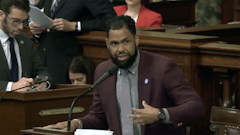
The Connecticut Senate passed legislation on Tuesday to legalize adult-use cannabis in the state, but the measure might be at risk as the current legislative session ends Wednesday night.
After several hours of debate, the Senate passed Senate Bill 1118 in a 19-17 vote at 1:51 a.m. Tuesday.
The bill arrived at the House of Representatives, where lawmakers were expected to vote on it during their June 9 session; however, a vote needed to be conducted before the legislative session ended at midnight to avoid the possibility of a special session. But with House Republicans vowing to filibuster the bill, a special session appears inevitable, the Connecticut Post reported.
Democratic Rep. Steve Stafstrom, who co-chairs the Joint Judiciary Committee and co-sponsored a previous version of the adult-use bill earlier this legislative session, said in a Tweet Wednesday afternoon, “[It’s] very unfortunate that the House GOP chose to stay on the sidelines all session long on this issue and then, at the 11th hour, deny a vote in the regular order. But make no mistake, legal cannabis will become law.”
In a follow-up statement, Democratic Senate President Martin Looney, who sponsored S.B. 1118, said, “We are disappointed the House Republicans are denying a vote on the cannabis bill. I am proud of the candid, straightforward and purposeful debate the Senate held earlier this week on cannabis and the House should do the same today. Our state deserves to know where their elected representatives stand, and threats of filibuster and partisan games should not get in the way of one of the most important issues of the year.”
According to the bill text, the legislation would legalize and regulate the sales of adult-use cannabis in the state, and if passed, retail sales are expected to begin in May 2022. It would also permit individuals 21 years and older to possess up to 1.5 ounces of cannabis in public and up to 5 ounces in their homes.
If passed, medical cannabis patients will be allowed to home-cultivate up to three mature and three immature plants for personal use beginning October 2021. Still, non-medical patients must wait until 2023 to home-cultivate, when they are legally permitted to do so, the National Organization for the Reform of Marijuana Laws (NORML) reported.
Nearly half of the state’s licenses to cultivate and sell cannabis would be granted to social equity applicants (or those who reside in neighborhoods adversely impacted by the war on drugs), the legislation states.
The measure would automatically expunge criminal records involving 4 ounces of cannabis or less and would permit those with more severe convictions to petition the courts to take action, the reform organization reported.
S.B. 1118 also limits discriminatory actions against those who test positive for past cannabis exposure in the workplace, protects parents and tenants who use cannabis in compliance with the law, mandates that police are not permitted to search an individual due to just cannabis odor, and takes away jail time for individuals under 18 years old who possess cannabis, according to NORML.
If the House approves the bill, it will head to Gov. Ned Lamont’s desk for his signature.
During his opening remarks on S.B. 1118 Monday night, Democratic Sen. Gary Winfield, who co-chairs the Joint Judiciary Committee, said it was important for state lawmaker to consider the history of cannabis in the U.S. before they voted.
At the beginning of the 20th century, Winfield said cannabis was widely available in drug stores, but then public views on cannabis changed when propaganda efforts surrounding cannabis prohibition included racial fears fueled by exaggerated stories of rape, murder and violence.
“This session has been a session where we’ve been talking about equity, talking about dealing with the policies of the past and making them right,” Winfield said. “To my mind, if cannabis has been made illegal, not because there was a real reason to do it, but to deal with the ‘others,’ whether they be the Mexicans in the early 1900s, or the hippies and the Blacks in the 1970s. That is not good public policy. And we have seen what has been brought by having a war on drugs; whole communities have been decimated.”
Republicans pushed back against the legislation, with 11 of 12 GOP Senate members casting no votes. During the lengthy floor debate, which extended into early Tuesday morning hours, Republican Sen. John A. Kissel, a ranking member of the Judiciary Committee, spent roughly 90 minutes outlining his concerns with adult-use legalization in Connecticut.
Kissel said he was a proponent and voted in favor of Connecticut’s medical cannabis bill that was passed and signed by former Gov. Dannel Malloy in 2012. But Kissel said earlier this week that he opposes adult-use legalization because of his concerns regarding the message it’ll send to young people, availability and impaired driving, among other reservations.
“I totally oppose this this [bill]. I think it sends a horrible message to our young people,” Kissel said Monday night on the Senate floor. “When a young person utilizes foreign substances that alter the brain’s normal mechanizations … it can be really debilitating to certain individuals.”
S.B. 1118 is the product of months of considerations surrounding adult-use cannabis legalization. The criminal justice aspect of the legislation was vetted and approved by the Joint Judiciary Committee in a 22-16 vote April 6—two months after Lamont unveiled his proposal for legalization during his budget address.
The version of the nearly 300-page bill that the Senate approved June 8 was the end product of negotiations between Lamont and Democratic leadership in the legislature.
"For decades, tens of thousands of Connecticut residents have faced arrest, prosecution and the lifelong stigma associated with marijuana criminalization—simply for possessing a substance that is objectively safer than alcohol, tobacco and many prescription medications,” said NORML State Policies Manager Carly Wolf. “This bill is a step toward addressing this shameful legacy and providing long-needed relief to communities that have disproportionately experienced the greatest hardship and collateral consequences of the war on drugs.”
























